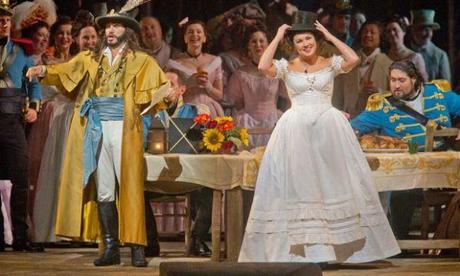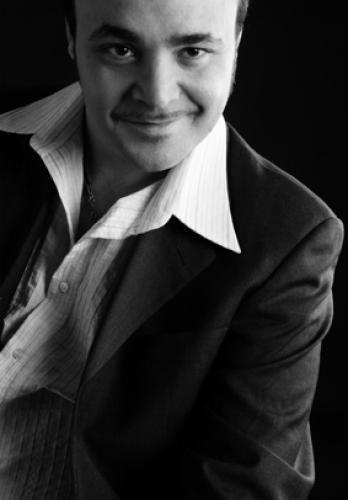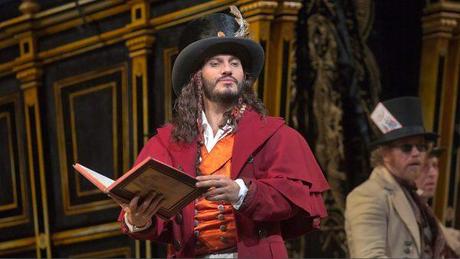Saturday Substitutions at the Met

Erwin Schrott & Anna Netrebko in L’Elisir d’Amore (Ken Howard/Met Opera)
There was a last-minute change in the cast of the January 25, 2014 Met Opera broadcast of Donizetti’s comic opera, L’Elisir d’Amore (“The Elixir of Love”), previously reviewed here when this colorful Bartlett Sher production was still new (see the following link: http://josmarlopes.wordpress.com/2013/02/10/lelisir-damore-the-elixir-of-love-old-wine-in-a-new-bottle/).
Instead of the previously announced Ramón Vargas in the key role of Nemorino — the not-too-bright, not-too-dumb lovesick hayseed — we had one of those all-too-frequent occurrences where a total unknown gets his or her million-to-one shot at stardom. For many artists, this could be the start of something big, that once-in-a-lifetime opportunity that propels a heretofore obscure talent into the world spotlight of potential fame and fortune.
Wow, after a buildup like that, who could blame a singer if the mounting expectations and added pressure never manifest themselves into something extraordinary. There have been dozens if not hundreds (or more) examples of such situations whereby the substitute in question floundered before the footlights, or failed to make a lasting impression of any worth — more so than the usual rags to riches story, I assure you!
One such event took place at the Metropolitan Opera in 2006, with the last-minute scheduling of Swedish-born soprano Erika Sunnegårdh as Leonore, in the Saturday broadcast of Beethoven’s Fidelio. The star of that show, Karita Mattila, suddenly took ill, while the ensuing media hype surrounding Erika’s debut was simply astounding. You’d have thought such a thing had never occurred before in the annals of Met performance history.
As it happened, I heard this particular Fidelio matinee outing on the radio and, while Erika’s efforts were highly praised and had indeed saved the performance from being cancelled, most likely debut nerves hindered her innate abilities from completely shining through. That was not just my impression, but that of several others in the press as well.
Since then, Erika has gone on to a successful career abroad, mostly in Europe and elsewhere. She even pinched hit for an indisposed Andrea Gruber in the Met’s luxurious presentation of Puccini’s Turandot back in 2007. So to say that her surprise appearances have not led to further operatic assignments is a gross exaggeration where this soprano is concerned. Can history repeat itself?

Tenor Salvatore Cordella saves the day
Well, about that Elixir of Love: the fellow who stepped into Vargas’ shoes was an Italian tenor named Salvatore Cordella. I must say that the flu season this winter has really hit the artistic side of things hard! I was therefore surprised — as I’m sure many of my fellow listeners were, too — that a suitable cover artist had not been booked far ahead of time. Where was Matthew Polenzani? Busy, I presume? How about Piotr Beczala? Is Rolando Villazon still active? Or maybe, Roberto Alagna? Were they all out of town?
Still, Signore Cordella dealt the best that he could with the situation at hand. In light of it all, the end results weren’t so bad. It wasn’t a great performance by any stretch, but what the heck! As that old comic genius, Gioachino Rossini, would undoubtedly say (were he alive to say it), “L’occasione fa il ladro!” Translation: “Opportunity makes the thief!”
Nemorino is, in my view, a surefire winner of a part. The tenor who takes on this lovable oaf cannot fail to gain sympathy and support. The opportunity was definitely there for Cordella to steal the public’s heart. A great artist can surely make an audience melt with a lilting rendition of that gorgeous second act aria, “Una furtiva lagrima” (“A furtive tear”). While Cordella didn’t exactly bring down the house — I felt his top voice was short at both ends, and a bit on the wiry and thin side — he earned a respectable ovation overall. And that’s the long and the short of it: Cordella gave a respectable showing, no more, no less. He did his job, he won the day, we can all move on now.
His colleagues on this occasion, Russian soprano Anna Netrebko as the spunky and spirited Adina, her real-life husband Erwin Schrott as the shyster salesman Dr. Dulcamara, and Nicola Alaimo as a rough and tumble Sgt. Belcore, all stepped in to help out. Of the principals, one could sense the comic timing and increased rapport between Ms. Netrebko and Mr. Schrott — indeed, that’s as it should be.

Erwin Schrott as Dr. Dulcamara (Ken Howard/Met Opera)
Erwin Schrott in particular put in a marvelous turn as Dulcamara, his ringing bass-baritone lending a slightly wily sound, a snarly bite and rapid banter to this normally broadly-interpreted part. He knowingly made the good doctor a serious “rival,” if that’s the term, for Adina’s affections. And he looked smashing in his broad-brimmed hat, long “hippie” locks, scraggly beard and flowing red cape. His predecessor, the gigantic Ambrogio Maestri, was delightful in the part, but his was an entirely different take all-together. Mr. Schrott, if I may be so bold, gave the old charlatan a more “dangerous” aspect to his mien, using his youthful physique and sex appeal to marvelous effect. If I were Adina, I’d give this guy a second look.
Anna Netrebko has matured so much in the last few years — her voice is now of true Verdian size, scope and heft — that I was pleased as Punch to learn she would be singing Lady Macbeth in next season’s production of the same composer’s Shakespearean tragedy Macbeth. As Donizetti’s Adina, she was as charming and outgoing as ever, and her Italian diction has improved immensely. Alaimo, too, brought his native language skills and pointed voice to the overbearing Belcore. And the conductor of this performance, Maurizio Benini, as noted on previous occasions, used his knowledge and flair on the podium to bring out the freshness and italianità of this and other staples of the bel canto repertoire.
All in all, this was a fairly pleasant performance, well played and well sung; nothing too challenging or daunting, and certainly nothing over-the-top. Another Saturday matinee, come and gone, in the long line of radio broadcasts. But now, on to bigger and better matters! Puccini’s Madama Butterfly and Richard Strauss’ Die Frau ohne Schatten await!!!
Copyright © 2014 by Josmar F. Lopes

